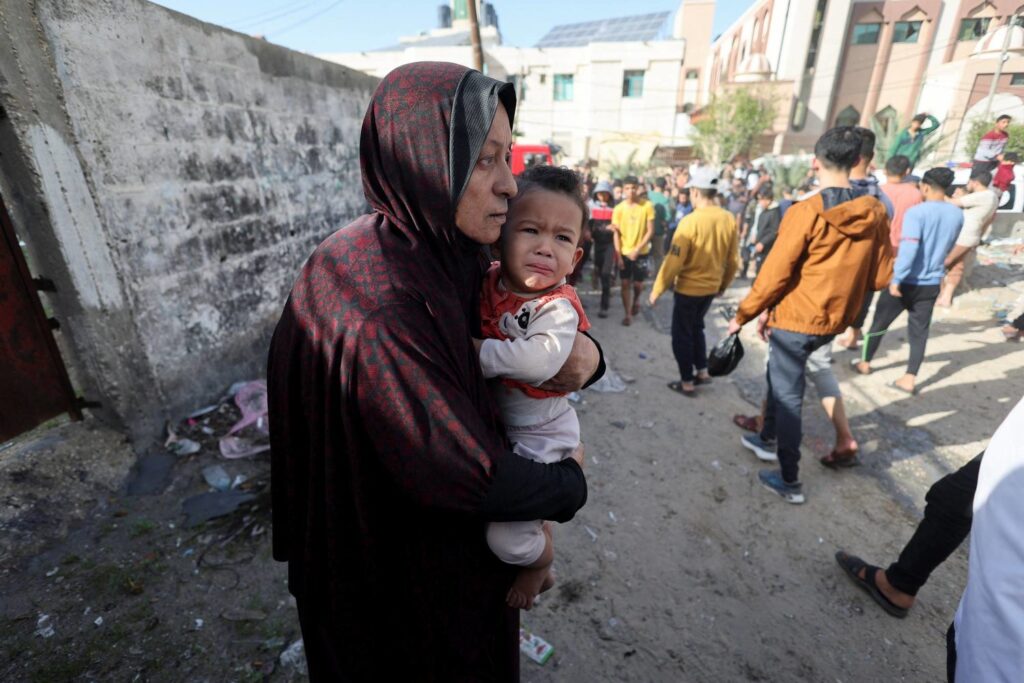DOHA/RIYADH: Palestinians huddled under bombardment in Gaza said on Monday they hoped a visit by the US secretary of state to the region would finally bring a ceasefire in time to avert a looming new Israeli assault on the last refuge on the edge of the enclave. .
Antony Blinken arrived in Riyadh at the start of his first trip to the Middle East since Washington brokered the first extended ceasefire offer with Israeli help.
The offer, presented to Hamas by Qatari and Egyptian mediators last week, is still awaiting a response from the militants, who say they want more guarantees that they will end the four-month-old war in the Gaza Strip.
“There’s no telling if we’ll get a breakthrough, when we’ll get a breakthrough,” a senior US official told reporters on a flight to the Saudi capital. “The ball is in Hamas’s court right now.”
Beyond the ceasefire itself, Blinken is trying to win support for US plans for what comes next: rebuilding and governing Gaza, and ultimately for a Palestinian state — which Israel now rejects — and for Arab countries to normalize relations with Israel.
“If we get a humanitarian pause, we want to be in a position to move to the various ‘day after’ parts as quickly as possible,” the US official said.
Washington is also trying to prevent further escalation elsewhere in the Middle East after days of US airstrikes against pro-Iranian armed groups across the region.
Meanwhile, Israel continued its offensive in some of the heaviest fighting of the war and threatened a new ground attack on Rafah, the small city where more than half of Gaza’s 2.3 million people are now held against the southern border of the enclave, which borders Egypt.
Also read: Is Narendra Modi’s India really a friend to the world?
The ceasefire proposal, described by sources close to the talks, would see a truce of at least 40 days in which the militants free civilians among the remaining hostages they are holding, followed by further phases of handing over soldiers and dead bodies.
The only previous ceasefire lasted only a week.
“We want the war to end and we want to go home, that’s all we want at this stage,” said Jamen Hamad, 35, a father of four, reached by a messaging app at a UN school in Deir al-Balah in central Gaza. The area is one of the few where Israeli tanks have not yet advanced, and is now crowded with tens of thousands of displaced families.
“All we do is listen to the news through small radios and look on the Internet for hope. We hope that Blinken will tell (Israeli Prime Minister Benjamin) Netanyahu enough and we hope that our factions will decide in the best interest of our people.
FIGHTING IN KHAN YOUNIS, GAZA CITY
In one of the biggest battles of the war, Israeli tanks have been advancing for the past two weeks in Khan Younis, the capital in the south, already home to hundreds of thousands of people who fled other areas. Fighting also resumed in Gaza City in the north of the Strip, in areas that Israel reportedly subdued in the first two months of the war.
The Israeli army said on Monday that its forces had killed dozens of Palestinian fighters in fighting in areas in northern, central and southern Gaza over the past 24 hours.
Palestinians have described heavy fighting in Gaza City, particularly in its western areas near the Mediterranean coast, which have been bombarded by Israeli warships. UNRWRA, the United Nations aid agency for Palestinians, said a food convoy headed there came under fire, although no one was injured.
In Khan Younis, Palestinian medics said they found the bodies of 14 people killed in the strike overnight. In recent days, they have repeatedly stated that rescuers will not be able to reach the many dead and injured in the city.
Authorities in Gaza said more than 27,000 Palestinians were confirmed killed in the Israeli attack, with thousands more feared unaccounted for in the rubble. Israel says it has lost 226 troops in Gaza since 1,200 people were killed and 253 taken hostage in the Oct. 7 attacks by Hamas that precipitated the war.
After Israel announced last week that it was preparing for a potential ground attack on Rafah, international aid agencies and the United Nations said they feared the humanitarian consequences would be catastrophic. Gazans fear it would drive them out of the enclave once and for all to Egypt.
An Israeli official told Reuters that the military would coordinate with Egypt and look for ways to evacuate most of the displaced people north to Gaza ahead of any crackdown on Rafah.
A cease-fire now might prevent such an attack, but it would mean Israel stops short of achieving its stated goal of destroying Hamas. Some far-right members of Netanyahu’s cabinet have said they would rather resign than support such a deal.
Netanyahu says he is committed to “total victory” and that any pause in the fighting would only be temporary as long as Hamas fighters are still at large. Hamas says it will not agree to a ceasefire or release its hostages unless it receives guarantees that Israel will withdraw from Gaza and end the war.
Exiled Hamas leader Ismail Haniyeh said last week he would travel to Cairo to deliver his response to the cease-fire proposal, but he has not yet arrived and Hamas has not set a timetable for his trip.
A Palestinian official familiar with the negotiations told Reuters that a response from Hamas could come “soon” but it was up to Blinken to push Netanyahu to make concessions.







